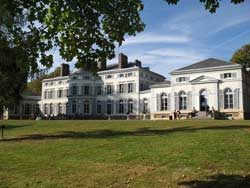The company’s enviable success, it turns out, had come at a price. Investigators believe that in 2007, TeliaSonera officials made hidden payments in order to secure its entry into Uzbekistan, a country whose dictatorial president controls business as tightly as he does politics, culture, and dissent.
To expand its Uzbek subsidiary, TeliaSonera had to obtain a license for a 3G network in the Central Asian country. But before doing so, the company engaged in months of secret negotiations with Uzbekistan's Karimov regime, two senior executives close to the deal confirmed in a report earlier this month by the Swedish Public Service Television (SVT) investigative news program "Mission: Investigate." Then, the company quietly purchased the licenses through an offshore shell company that the Organized Crime and Corruption Reporting Project (OCCRP) has been able to show was owned by a Karimov associate.
Ongoing investigations into this deal prompted the announcement of the resignation next April of TeliaSonera Chairman Anders Narvinger, who said his reason for leaving was to give the company "a new start." Meanwhile, TeliaSonera CEO, Lars Nyberg, who in September had staked his job on the company emerging from this scandal cleared of all charges, announced in October that he planned to leave his post early if a successor can be found. And, as SVT reported in its most recent broadcast, investigators in TeliaSonera's home country of Sweden recently informed two senior executives that they were formally suspected of bribery.
Growth of a Giant
In the early 2000s, Swedish telecommunications giant TeliaSonera was a booming company with a common Nordic problem: it had outgrown its own market. Having established a legal monopoly in Sweden in 2002, when it was created through a merger between the Swedish telecom Telia and the Finnish Sonera, by 2004 the company had swallowed up the Scandinavian market, easily becoming the leading provider.
But TeliaSonera still craved growth. So management looked overseas, realizing that less-developed countries in Eurasia and the Caucasus represented profound profit opportunities. TeliaSonera was soon snaking through the phone lines of Azerbaijan, Belarus, Estonia, Kazakhstan, Latvia, Lithuania, Moldova, Nepal, Russia, Spain, Tajikistan and Turkey.
That decade-long expansion wasn’t entirely smooth. Breaking into emerging markets like the former Soviet bloc generated huge profits – helping the company reach an income last year of $5.0 billion with a quarter of that coming from Eurasia. But working with post-Communist regimes still enforcing repressive policies wasn't great for the communication firm’s image. Throughout its expansion, TeliaSonera cultivated a do-gooder reputation, often boasting of the importance of communications in protecting and promoting democracy. In a March, 2012 statement, the company said, “the suppression of the freedom of expression is a global threat…We feel that it is important to be present and build mobile networks also in countries where it is likely that the opposition will be wiretapped in a way which would be unacceptable in Sweden.”
But soon, that image began to crumble and the rhetoric smacked of irony. Far from promoting democracy, the telecom was found, on several occasions, to aid the regimes of dictatorships monitoring and spying on citizens. An April investigation by 'Mission: Investigate' revealed that TeliaSonera had been using its technology to allow authorities in dictatorships like Belarus, Kazakhstan, Azerbaijan, Tajikistan, and Uzbekistan to tap phones and monitor the communications of dissidents and other citizens. The Swedish state and other shareholders subsequently condemned TeliaSonera publicly for those actions.
And things only got worse. If the 2007 deal granting TeliaSonera entry into Uzbekistan represented a culmination of its global ambitions, the opaque dealings that made it possible marked a new low for the company.
Paying off a Dictator
When it paid close to $320 million for the requisite 3G license, TeliaSonera bought them not from the state, which by law is the only entity permitted to sell them, but from a tiny, low-profile offshore company registered in the tax haven of Gibraltar. That company was called Takilant Ltd, and it was run by a close friend and business partner of Uzbekistan’s ruling family.
SVT working with OCCRP determined that Takilant’s owner, Gayane Avakyan, is an Armenian woman who lives in Uzbekistan and worked in the fashion industry. She is a former coworker and close associate of Gulnara Karimova, President Islam Karimov’s controversial daughter. Avakyan worked as director of Karimova’s fashion company, ”House of Style,” in the Uzbek capital of Tashkent for several years, and photos from that time and since show her enjoying a close relationship with her former employer, who is rumoured to be in line to succeed her father as the country’s ruler. The Chateau de Groussay is a registered historic monument built in 1815 for the Duchesse of Charost, the daughter of the governess of Louis XVI and Marie Antoinette. Photo: Wikipedia
The Chateau de Groussay is a registered historic monument built in 1815 for the Duchesse of Charost, the daughter of the governess of Louis XVI and Marie Antoinette. Photo: Wikipedia
Avakyan is further connected to Karimova through officers at Panally Ltd, Takilant’s London subsidiary. Panally’s former secretary, Ekaterina Klyueva, worked with Karimova and Avakyan at House of Style in 2003, and a current Panally secretary is also a secretary for Odenton Management Ltd, a company that belongs to Gulnara Karimova’s alleged boyfriend, Uzbek pop star Rustam Madumarov. Also, Panally and Odenton share the same address, and were incorporated by the same agents.
When TeliaSonera made its 2007 licensing purchase, Gulnara Karimova's friend Bekhzod Akhmedov was in charge of the negotiations, according to documents obtained by Swedish prosecutors. Akhmedov – who suddenly left Uzbekistan this summer amid a separate set of fraud charges and a falling out with Karimova -- negotiated the payment from TeliaSonera to Karimova through the Gibraltar offshore and even handled the money for Takilant. The talks took place in Akhmedov’s offices, even though he was at the time the CEO of the competing telecom Uzdunrobita, the Uzbek subsidiary of the Russian Mobile TeleSystems.
Incidentally, the alleged boyfriend Rustam Madumarov made off well on paper through the Uzbek governments deals with Takilant and the other communications companies. In February 2010, Madumarov established a company called Chateau de Groussay, which he later renamed Rubis International. The purpose of the French registered company was to purchase the historic Chateau de Groussay, located on 67 acres of land outside Paris. He appointed Akhmedov director of this company and put him in charge of the chateau purchase.
Akhmedov was removed as director of that company in July 2012, possibly because Madumarov knew that Akhmedov was being cast out from Karimova’s circle of business associates, as evidenced by criminal charges he faced in Uzbekistan. Akhmedov left Uzbekistan on June 6 amid fraud charges relating to his role as the head of the telecom subsidiary he ran. He was convicted in absentia on September 17th, and is missing and could be living in Moscow.
As part of the deal Akhmedov struck with TeliaSonera in 2007, Karimova would eventually receive about 26 percent of the shares of the subsidiary TeliaSonera would form in Uzbekistan, SVT’s sources said. TeliaSonera would buy back the shares 2-3 years later for a pre-arranged price. Finally, in late 2007, Uzbek authorities released the licenses to TeliaSonera, by way of a small local company called Teleson Mobile, owned by Avakyan of Takilant Ltd.
TeliaSonera kept secret its ownership of the Uzbek licenses for several months after that blockbuster deal in 2007. During those months, management referred to the company’s Uzbek ambitions only in the future tense, misleading shareholders and the public regarding the purchase. For instance, at a Tashkent press conference in January of 2008, CEO Lars Nyberg announced the company's “plan to acquire a 3G license in the same way as other operators in Uzbekistan," saying that investors could "expect more information in the spring."
Why would TeliaSonera make this impressive purchase only then to conceal it? A close look at the deal reveals several red flags that may have encouraged that low profile.
To begin, Takilant was never authorized to sell the 3G rights. Uzbek law says only the government can award telecom licenses, and even then the process must involve a bidding competition in which only Uzbekistan-registered companies may participate. No such process took place for the Swedish-registered TeliaSonera.
The license broker Takilant Ltd should have also raised concerns with TeliaSonera or anyone looking at the deal. The shell company operated no offices, and had no history and no solid assets of its own. It was registered in an offshore tax haven and run by a then 24-year old businesswoman with no experience or connections to the telecom industry. Prosecutors are now asking whether Takilant was just a vehicle to launder a bribe or kickback to the first family to buy access to the tightly-controlled market.
Fuelling that theory is the fact that TeliaSonera is the third foreign investment in the Uzbek telecom sector that has followed a near identical path. In 2007, Russian mobile phone provider VimpelCom, partnered with Takilant as it worked on expanding into Uzbekistan. And in 2004, the Russian company MTS made its own way into Uzbekistan by purchasing a local operator called Swisdorn, which turned out to be a sort of sister company to Takilant, sharing the same mailbox and owned by Karimova’s alleged boyfriend, Madumarov.
Former corruption investigator Lars Hammar told Swedish News Agency TT he believes this pattern makes TeliaSonera’s deal even more suspicious. “It gives the impression that they had their doubts but decided to gamble anyway. As if they said: ‘It worked twice before, let’s try it again’,” he told the outlet in an October interview.
The Real Beneficiary Shahlo Ruzimatova served as a secretary at both the Takilant-owned Panally and London-based Odenton company owned by Karimova’s boyfriend.
Shahlo Ruzimatova served as a secretary at both the Takilant-owned Panally and London-based Odenton company owned by Karimova’s boyfriend.
The relationships recently exposed suggest that the money may have ultimately wound up with Gulnara Karimova. Takilant's own accounting records show no trace of the payment from TeliaSonera for the Uzbek telecom licenses, a fact that investigators say adds to the evidence that the Takilant deal was no more than a laundering scheme.
When Swedish TV visited Takilant’s company registrar in Gibraltar – where the company keeps its records since it has no offices itself – reporters asked the agent there why Takilant’s records would show no trace of the TeliaSonera payment. “Might be,” he said, smiling, “that the payment was agreed between parties to go elsewhere,” Swedish TV reported.
Right after the SVT airing, Swedish officials acted. On September 26th, Swedish prosecutors opened a formal inquiry into TeliaSonera's purchase of the Uzbek licenses, assigning the probe to their "anti-corruption unit." As part of that investigation, authorities froze a Takilant account with $30 million at Nordea Bank in Sweden. That account is in the name of Alisher Ergashev, a Coca Cola executive in Uzbekistan and a business partner of first daughter Karimova. Nordea had set up the account for Takilant at the request of TeliaSonera who is a top-five customer at the bank. Swedish prosecutors are gunning for another $290 million in other accounts where TeliaSonera held deposits.
The Swiss Connection
Ergashev is a key figure in a second investigation. Three months before SVT aired its program outlining the connections between Karimova and Takilant, authorities had already quietly acted based on reports of suspicious client activities from a bank.
In early 2009, Bekhzod Akhmedov, still on good terms with Karimova, opened an account on behalf of Takilant in the private Swiss bank Lombard Odier. Soon, millions of Swiss Francs began to pour in to that account by way of Asia. The money may have been TeliaSonera funds routed by Takilant to Hong Kong and then back to Switzerland.
In late June, 2012, someone tried to access that bank account but was not allowed to do so, because Akhmedov was the only person listed as an account holder. A few days later, another attempt to access the funds was made, this time by two Uzbek nationals who presented themselves as executives of Coca-Cola Uzbekistan. Those two men –Ergashev and Shohruh Sabirov, according to media reports – were accompanied by Avakyan.
Bank officials became suspicious and checked Akhmedov. They realized Akhmedov appeared on Interpol’s ‘Wanted’ list, having been by now accused of fraud in Uzbekistan. They informed Switzerland’s anti-money laundering office, and Swiss prosecutors immediately launched an investigation, in the process freezing a series of accounts that contained US$650 million.
The next month, Ergashev and Sabirov were arrested in Geneva. Their alleged crime was attempting to access the Takilant accounts using documents that had been forged abroad.
Ergashev, who was also a holder of the Takilant account at Nordea bank in Sweden, served as director of two companies owned by Karimova, according to French business documents uncovered by OCCRP. The companies were Invest Service Group, founded in 2009, and Invest Studio, founded in 2010. The records show he was in charge of the purchase of two properties: a luxury apartment in Paris and a hotel in the French Riviera town of Gassin.
Ergashev and Sabirov, Karimova’s two business partners, appear to be at the center of a series of connections that link Karimova to Takilant Ltd., the company that illegally sold telecom licenses for her country and immediately funneled the proceeds elsewhere.
The investigation by Swiss authorities’ finally came to light publicly in August, 2012, when local media were tipped off by a highly unlikely event: a public protest in Uzbekistan’s capital city of Tashkent. A handful of picketers held signs in front of the Swiss embassy there, protesting the Swiss detention of Ergashev and Sabirov after their arrest in the money laundering case. Such demonstrations are unheard of in a country with an authoritarian president who despises dissent and has allegedly ordered hundreds of protesters killed in the recent past.
But the protesters that day didn’t have to fear for their safety. Local news sources later determined the protest had been arranged by the “Forum of Culture and Art of Uzbekistan,” a group established by Gulnara Karimova.
Internal Investigation
In early October, TeliaSonera promised to make its own investigation into the controversial 2007 purchase, hiring the 3rd-party law firm of Mannheimer Swartling – a long standing consultant to TeliaSonera – to examine the deal for “any form of corruption or money laundering.” The company will not comment specifically until this report is completed in January.
"The allegations directed at TeliaSonera are very serious,” CEO Nyberg said in a radio interview with Swedish Public Service Radio when he announced the internal study. “It is important that an independent party now reviews the transaction and truly gets to the bottom of all allegations and rumors which have flourished in recent weeks." It was in that radio interview that Nyberg staked his job on the company being exonerated of any wrongdoing, saying he would resign if the charges prove to be true. He announced later that month that he would be leaving his position.
Meanwhile, in the latest developments surrounding this case, Ergashev and Sabirov, the two men whose arrest prompted the puppet-show protest in Tashkent in August, were suddenly and inexplicably released on bail on October 15. The Swiss Attorney General's office confirmed that the two men flew back to Uzbekistan, but refused to explain the grounds for that decision or the terms of the men's release.
This story is based on the reporting of Swedish Television, TT News Agency and OCCRP and used with permission. Written by Eliza Ronalds-Hannon and Miranda Patrucic with original reporting by Patrucic.






